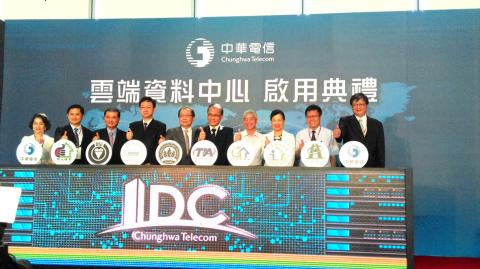Chunghwa Telecom Co (CHT, 中華電信), the nation’s biggest telecom operator, yesterday launched its new cloud computing data center in a bid to accelerate the nation’s digital economy and industry transformation.
“We aim to elevate Taiwan to one of the leading data hubs in Asia and attract international businesses, such as over-the-top content providers, as well as boosting the nation’s financial technology development,” chairman Rick Tsai (蔡力行) said at the facility’s opening ceremony in New Taipei City’s Banciao District (板橋).
The international data corp facility covers 90,000m2, has 4,500 server racks and cost NT$13 billion (US$407 million) to build, the company said.

Photo: Ho Yu-hua, Taipei Times
The complex is adjacent to the Taiwan Stock Exchange and the Taiwan Futures Exchange data facilities to achieve low latency for financial-sector clients, the company said, adding that it provides virtual private network solutions to more than 80 percent of local brokerages.
On Thursday, the company told an investors’ conference that its capital expenditure in the first half fell 34.6 percent annually to NT$6.8 billion, meeting only 22 percent of its goal for this year.
“Our expenditure target this year remains unchanged at NT$30.6 billion,” Tsai told reporters yesterday, adding that the dip in the first half was due to slower-than-expected progress in a number of construction projects.
“Construction and spending will accelerate in the second half, meeting the target for this year,” Tsai said.
Credit Suisse Group AG analyst Varun Ahuja said in a note that the company’s capital expenditure is expected to increase in the second half, mainly on new submarine cable and other information and communications technology-related projects.
Tsai yesterday reiterated the company’s goal to add 2 million 4G mobile subscribers before the end of this year and bolster its 37.5 percent market share.
The company’s enterprise solution sales are expected to grow from 4 to 5 percent of the company’s total revenue last year to between 6 and 8 percent, helped by the new facility and expanded capacity, Chunghwa Telecom president Shih Mu-piao (石木標) said on Thursday.
However, Shih said enterprise solution sales have much lower margins compared with the company’s consumer telecoms services.
Meanwhile, the company is facing slowing growth in higher-tier subscription counts, as Taiwan’s 4G penetration has reached 50 percent.
“Most higher-tier subscribers have already upgraded to 4G and future growth will rely on lower-tier 2G and 3G holdouts,” Shih said.
At the same time, rising competition from rival carriers in the lower-tier segments, as well as SIM card consolidation among subscribers have strained the company’s average revenue per user performance, he said.
Shih said that it would take considerable time before consumers adjust to the company’s new pricing structure, which was launched in April, and that the company is not expecting tangible improvements in earnings from its new NT$999 and NT$1,399 data plans in the near term.
Consumers prefer unlimited or generous data plans to high handset purchase subsidies, Shih said, adding that the current iPhone model is not as popular as its predecessors, leading to diminished demand.

SEEKING CLARITY: Washington should not adopt measures that create uncertainties for ‘existing semiconductor investments,’ TSMC said referring to its US$165 billion in the US Taiwan Semiconductor Manufacturing Co (TSMC, 台積電) told the US that any future tariffs on Taiwanese semiconductors could reduce demand for chips and derail its pledge to increase its investment in Arizona. “New import restrictions could jeopardize current US leadership in the competitive technology industry and create uncertainties for many committed semiconductor capital projects in the US, including TSMC Arizona’s significant investment plan in Phoenix,” the chipmaker wrote in a letter to the US Department of Commerce. TSMC issued the warning in response to a solicitation for comments by the department on a possible tariff on semiconductor imports by US President Donald Trump’s

The government has launched a three-pronged strategy to attract local and international talent, aiming to position Taiwan as a new global hub following Nvidia Corp’s announcement that it has chosen Taipei as the site of its Taiwan headquarters. Nvidia cofounder and CEO Jensen Huang (黃仁勳) on Monday last week announced during his keynote speech at the Computex trade show in Taipei that the Nvidia Constellation, the company’s planned Taiwan headquarters, would be located in the Beitou-Shilin Technology Park (北投士林科技園區) in Taipei. Huang’s decision to establish a base in Taiwan is “primarily due to Taiwan’s talent pool and its strength in the semiconductor

An earnings report from semiconductor giant and artificial intelligence (AI) bellwether Nvidia Corp takes center stage for Wall Street this week, as stocks hit a speed bump of worries over US federal deficits driving up Treasury yields. US equities pulled back last week after a torrid rally, as investors turned their attention to tax and spending legislation poised to swell the US government’s US$36 trillion in debt. Long-dated US Treasury yields rose amid the fiscal worries, with the 30-year yield topping 5 percent and hitting its highest level since late 2023. Stocks were dealt another blow on Friday when US President Donald

UNCERTAINTY: Investors remain worried that trade negotiations with Washington could go poorly, given Trump’s inconsistency on tariffs in his second term, experts said The consumer confidence index this month fell for a ninth consecutive month to its lowest level in 13 months, as global trade uncertainties and tariff risks cloud Taiwan’s economic outlook, a survey released yesterday by National Central University found. The biggest decline came from the timing for stock investments, which plunged 11.82 points to 26.82, underscoring bleak investor confidence, it said. “Although the TAIEX reclaimed the 21,000-point mark after the US and China agreed to bury the hatchet for 90 days, investors remain worried that the situation would turn sour later,” said Dachrahn Wu (吳大任), director of the university’s Research Center for